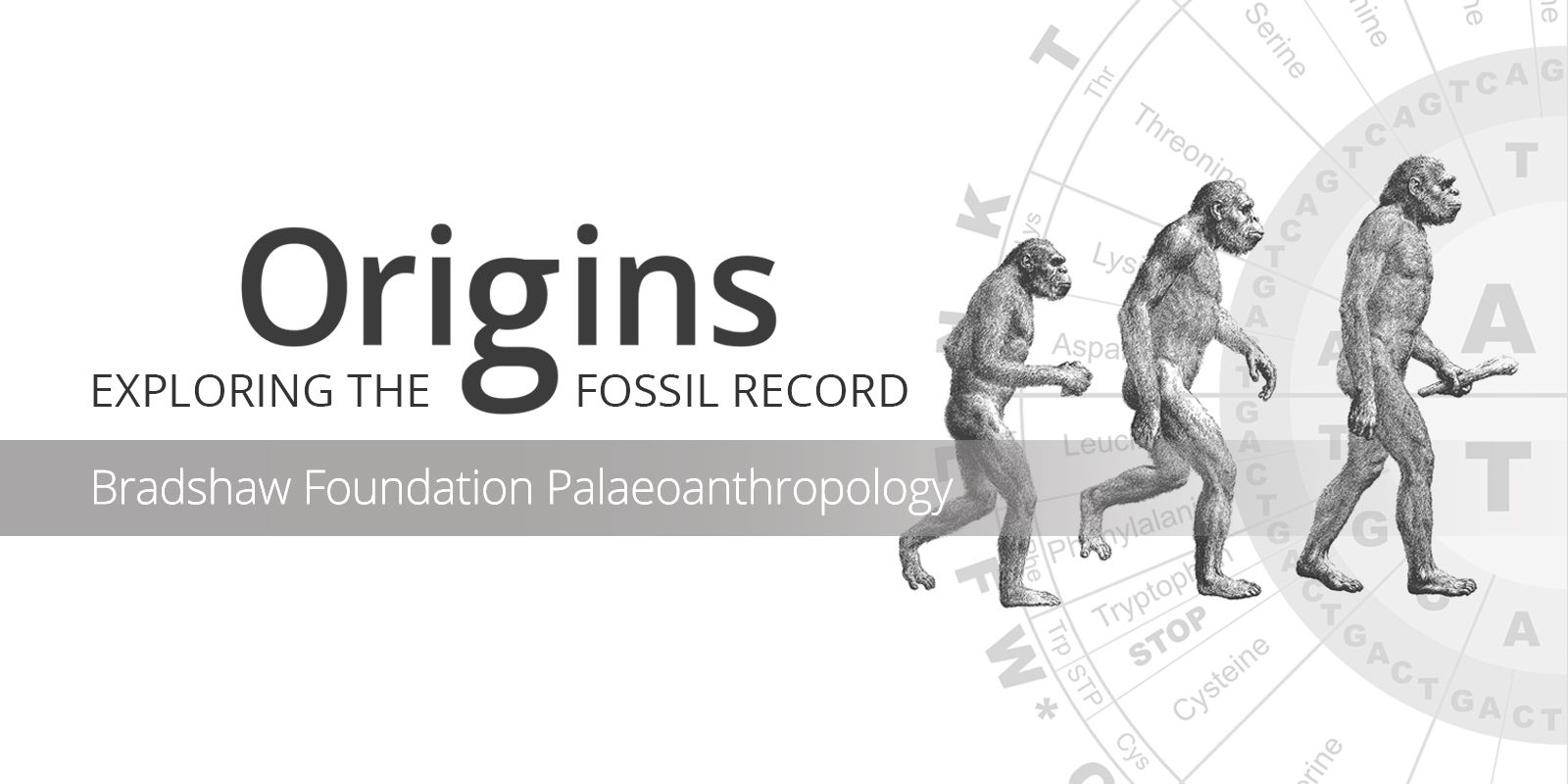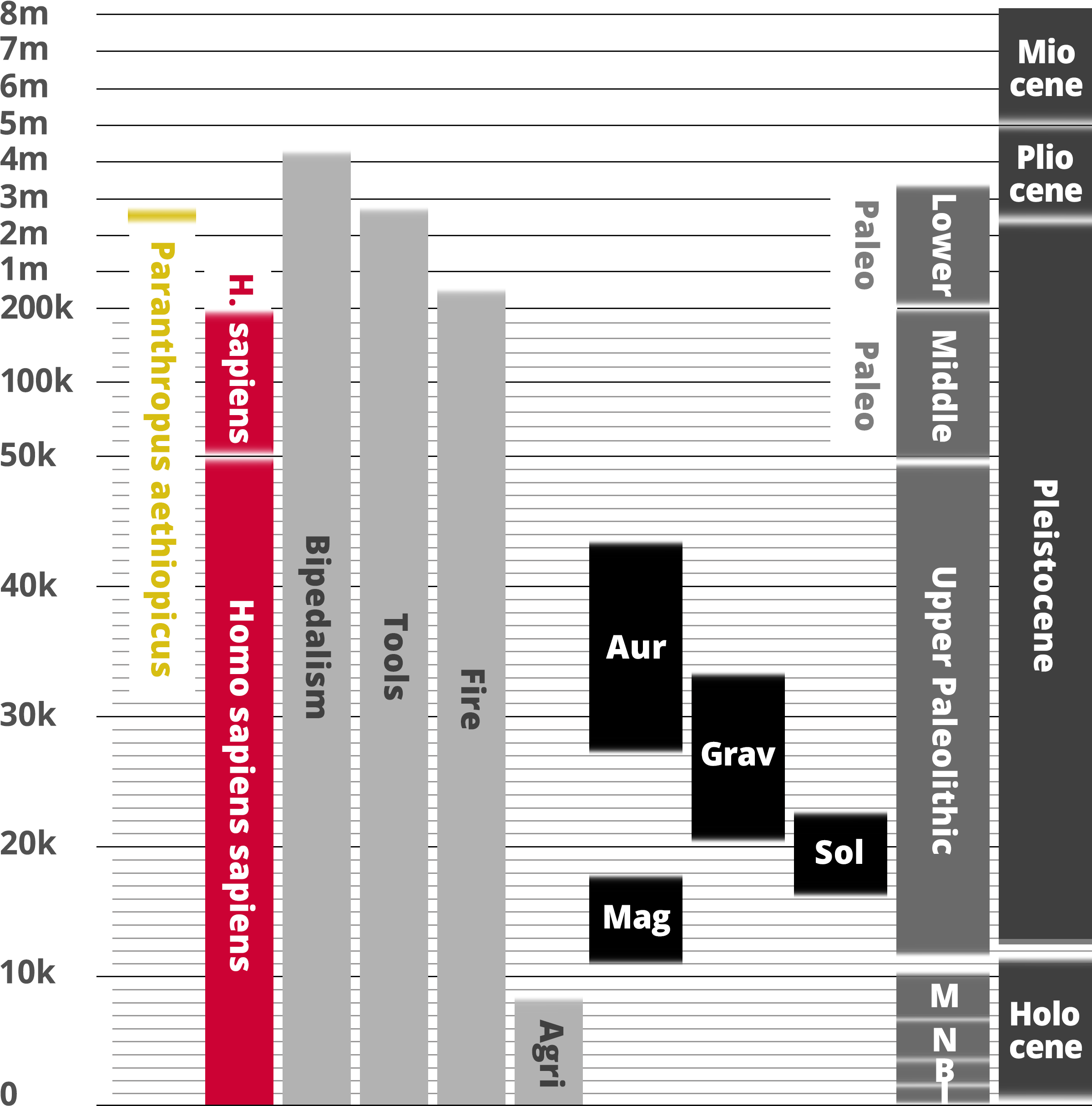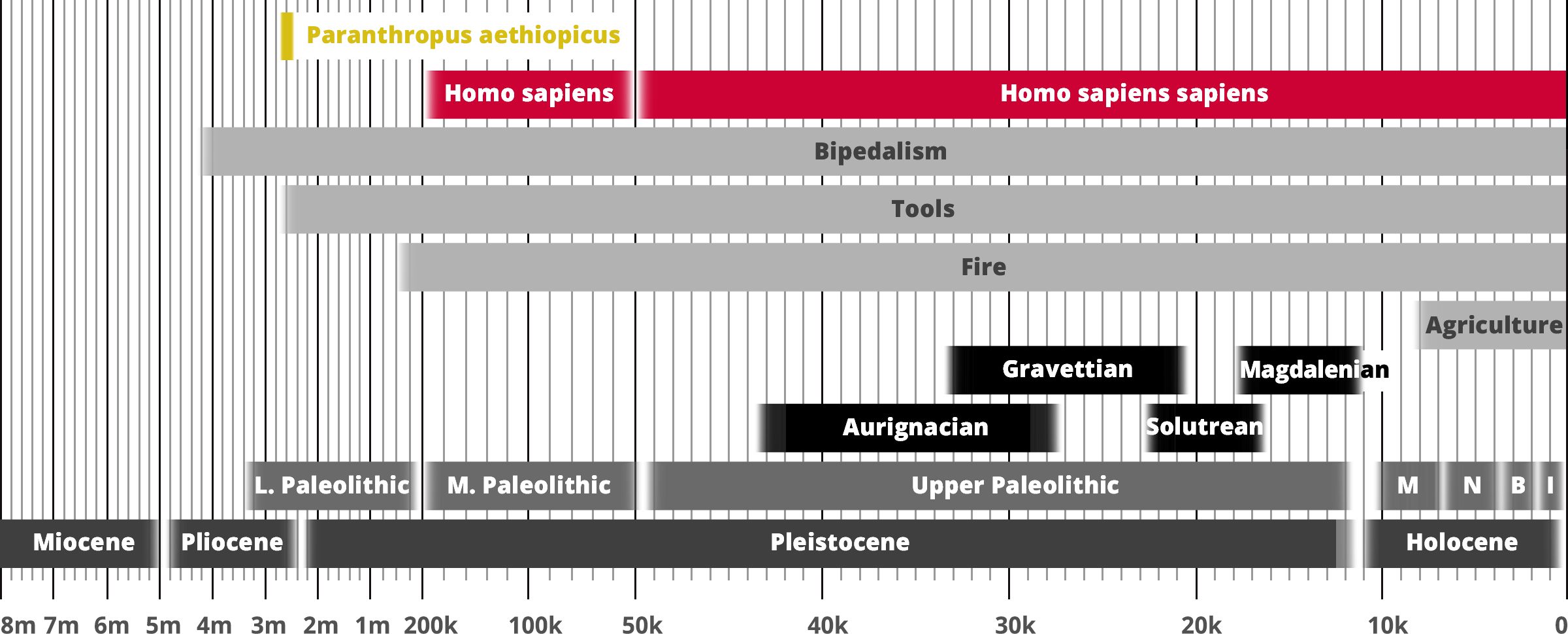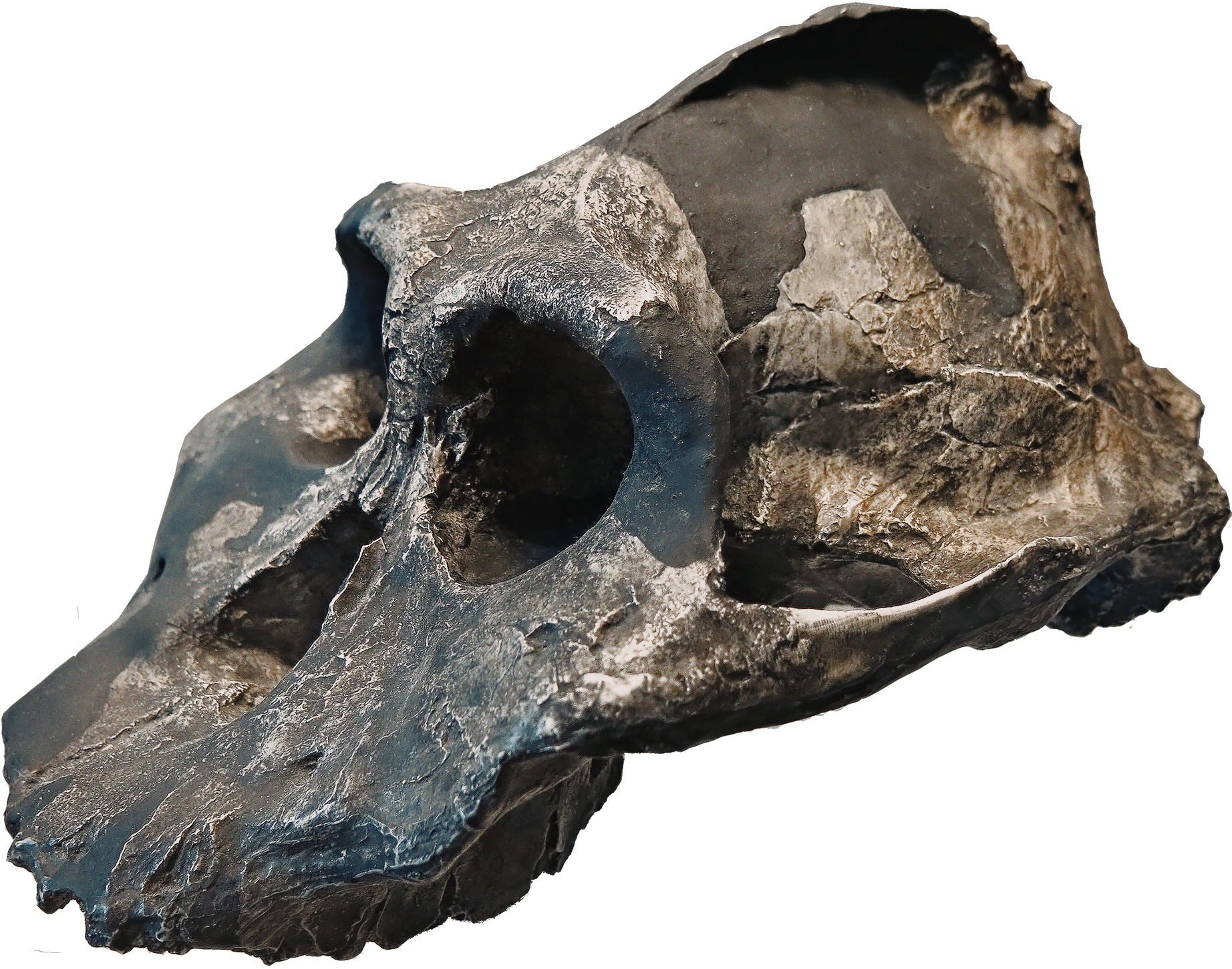Paranthropus aethiopicus
Homo sapiens
Hominin traits
Archaeological industry/Technocomplex including art
Period in human prehistory: M = Mesolithic; N = Neolithic; B = Bronze Age; I = Iron Age;
Geological epoch
* Note: Table based past and current research and scientific consensus
Paranthropus aethiopicus
Homo sapiens
Hominin traits
Archaeological industry/Technocomplex including art
Aur = Aurignacian; Mag = Magdalenian;
Grav = Gravettian; Sol = Solutrean
Period in human prehistory:
M = Mesolithic; N = Neolithic;
B = Bronze Age; I = Iron Age;
Geological epoch
* Note: Table based past and current research
and scientific consensus
| PARANTHROPUS AETHIOPICUS |
 |
| Genus: |
Paranthropus |
| Species: |
Paranthropus aethiopicus |
| Other Names: |
Black Skull |
| Time Period: |
2.7 to 2.5 million years ago |
| Characteristics: |
'Black Skull', West Turkana, Kenya, Africa |
| Fossil Evidence: |
Cranium Fossil, Tanzania, Africa |
Paranthropus aethiopicus or Australopithecus aethiopicus is an extinct species of hominid, one of the robust australopithecines. The finding discovered in 1985 by Alan Walker in West Turkana, Kenya, is known as the 'Black Skull' due to the dark coloration of the bone, caused by high levels of manganese. Paranthropus aethiopicus is one of the earliest examples of robust pliocene hominids.
The skull is dated to 2.5 million years ago, older than the later forms of
robust australopithecines. Anthropologists suggest that Paranthropus aethiopicus lived between 2.7 and 2.5 million years ago. The features are quite primitive and share many traits with
Australopithecus afarensis; thus Paranthropus aethiopicus may be a direct descendant.
Paranthropus aethiopicus is thought to have lived in mixed savanna and woodland, and although little else can be surmised due to the lack of fossil evidence, this species is believed to be on an evolutionary branch of the hominid tree, distinctly diverging from the Homo lineage.
Paranthropus aethiopicus - an extinct species of robust australopithecine - appears from the Late Pliocene to Early Pleistocene of East Africa about 2.7–2.3 million years ago. However, it is much debated whether or not Paranthropus is an invalid grouping and is synonymous with Australopithecus, so the species is also often classified as Australopithecus aethiopicus.

Reconstruction of Paranthropus aethiopicus
In 1968, French palaeontologist Camille Arambourg and Breton anthropologist Yves Coppens described "Paraustralopithecus aethiopicus" based on a toothless mandible (Omo 18) from the Shungura Formation, Ethiopia. The name aethiopicus refers to Ethiopia. In 1976, American anthropologist Francis Clark Howell and Coppens reclassified it as
Australopithecus africanus.
In 1985, the skull KNM WT 17000 dating to 2.5 million years ago was reported from Koobi Fora, Lake Turkana, Kenya, by anthropologists Alan Walker and Richard Leakey. A partial jawbone from a different individual, KNM-WT 16005, was also discovered. They clearly belonged to a robust australopithecine. By this point in time, much younger robust australopithecines had been reported from South Africa (
Paranthropus robustus) and East Africa (
Paranthropus boisei), and been variously assigned to either Australopithecus or a unique genus Paranthropus. Walker and Leakey assigned KNM WT 17000 to the boisei clade. They noted several anatomical differences, but were unsure if this stemmed from the specimens' archaicness or represented the normal range of variation for the species. If the former, they recommended classifying them and similar specimens into a different species, aethiopicus (and recommended that Paraustralopithecus be invalid). The discovery of these archaic specimens overturned previous postulations that
Paranthropus robustus was the ancestor of the much more robust
Paranthropus boisei by establishing the boisei lineage as beginning long before robustus had existed.
In 1989, palaeoartist Walter Ferguson recommended KNM WT 17000 be classified into a different species, walkeri, because the holotype of aethiopicus comprised only the jawbone and KNM WT 17000 preserves no jaw elements. Ferguson's classification is almost universally ignored, and is considered to be synonymous with Paranthropus aethiopicus.
Typical of Paranthropus, KNM WT 17000 is heavily built, and the palate and base of the skull are about the same size as the P. boisei holotype OH 5. The brain volume of KNM WT 17000 was estimated to have been 410 cc, which is smaller than that of other Paranthropus. The combination of a tall face, thick palate, and small braincase caused a highly defined sagittal crest on the midline of the skull. The only complete tooth crown of the specimen is the right third premolar, whose dimensions are well above the range of variation for
Paranthropus robustus and on the upper end for
Paranthropus boisei. Unlike other Paranthropus, KNM WT 17000 did not have a flat face, and the jaw jutted out (prognathism). In regard to the temporal bone, KNM WT 17000 differs from other Paranthropus in that the squamous part of temporal bone is extensively pneumaticised, the tympanic part of the temporal bone is not as vertically orientated, the base of the skull is weakly flexed, the postglenoid process is completely anterior to (in front of) the tympanic, the tympanic is somewhat tubular, and the articular tubercle is weak. Like
Paranthropus boisei, the foramen magnum where the skull connects to the spine is heart-shaped. The temporalis muscle was probably not directed as forward as it was in
Paranthropus boisei, meaning the Paranthropus aethiopicus jaw likely processed food with the incisors before using the cheek teeth. The incisors of
Paranthropus boisei are thought to have not been involved in processing food. The long distance between the first molar and the jaw hinge would suggest KNM WT 17000 had an exceptionally long ramus of the mandible (connecting the lower jaw to the skull), though the hinge's location indicates the ramus would not have been particularly deep (it would have been weaker). This may have produced a less effective bite compared to P. boisei.
In general, Paranthropus are thought to have been generalist feeders, with the heavily built skull becoming important when chewing less desirable, lower quality foods in times of famine. Unlike
Paranthropus boisei which generally is found in the context of closed, wet environments, Paranthropus aethiopicus seems to have inhabited bushland to open woodland habitats around edaphic (water-logged) grasslands. Around 2.5 million years ago, at the Pliocene/Pleistocene border, the Omo–Turkana Basin featured a mix of forests, woodlands, grasslands, and bushlands, though grasslands appear to have been expanding through the Early Pleistocene. Homo seems to have entered the region 2.5–2.4 million years ago.











